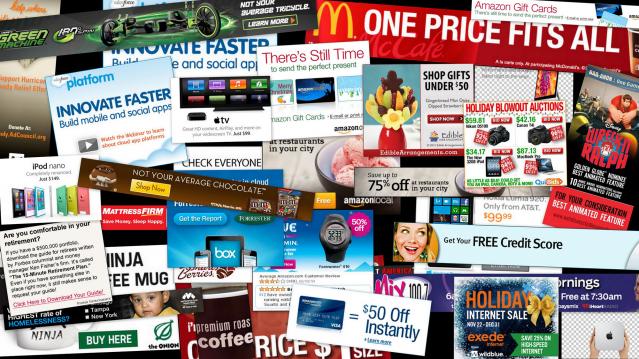The Amount of Money Lost to Ad-Blocking Is Skyrocketing

Are you annoyed by online pop-up ads or those video commercials that automatically start playing when you visit a new Web page? Worried about advertisers collecting your personal information online? You’re not alone. In the perpetual cat and mouse game between marketers and Internet users, the utilization of ad-blocking software by Web surfers is growing rapidly — and it’s costing advertisers billions.
Ad-blocking technology was employed by 45 million active users during the second quarter of 2015, a new report by PageFair and Adobe found. This represents 16 percent of the U.S. online population. In the past year, the number of users blocking ads grew by 48 percent.
In 2014, ad-blocking in the U.S. cost an estimated $5.8 billion in lost advertising revenue. That figure is expected to jump to $10.7 billion in 2015 and $20.3 billion in 2016 as more users adopt the practice. The new version of Apple’s mobile operating system coming this fall is expected to make the problem worse, since it will allow iPhone users to block ads in Safari with a simple app.
In addition to lost revenue, ad-blocking skews the demographics of the online audience. Websites that cater to younger users — a demographic advertisers are eager to target — are the ones most significantly affected by ad-blocking.
Related: The Future of Advertising: Everything, Everywhere, All the Time
A survey in the PageFair/Adobe report found that the main reason individuals block ads is a concern about advertisers mishandling personal data.
Advertisers have a long way to go when it comes to trust. An article in AdAge argues that marketers should be more transparent about the ways they use the information they collect. It recommends giving users more control of their personal data, the ability to decide how much information to share and the choice to opt-out at any time.
Trust isn’t the only issue, though. The appeal of ad-blocking is growing as “malvertising” attacks become more common. Last month, Yahoo’s ad network was targeted for seven days by hackers who sent out corrupt bits of code through Flash-based ads to visitors on Yahoo’s popular sites. Some users were redirected to sites that paid the hackers for traffic, while others had their computers locked for ransom.
Top Reads from The Fiscal Times:
- Bush Looks to Make Up for Past Blunders on Iraq Policy
- Oil Sector Insiders Signal It’s Time to Buy
- How a Soaring Dollar Forced China to Devalue Its Currency
Small Business Owners Say They’re Raising Worker Pay
A record percentage of small business owners say they are raising pay for their workers, according to the latest monthly jobs report from the National Federation of Independent Business, based on a survey of 10,000 of the group’s members. A seasonally adjusted net 35 percent of small businesses say they are increasing compensation. “They are increasing compensation at record levels and are continuing to hire,” NFIB President and CEO Juanita Duggan said in a statement accompanying the report. “Post tax reform, concerns about taxes and regulations are taking a backseat to their worries over filling open positions and finding qualified candidates.”
The US Is Running Short on More Than 200 Drugs

The U.S. is officially running short on 202 drugs, including some medical staples like epinephrine, morphine and saline solution. “The medications most vulnerable to running short have a few things in common: They are generic, high-volume, and low-margin for their makers—not the cutting-edge specialty drugs that pad pharmaceutical companies’ bottom lines,” Fortune’s Erika Fry reports. “Companies have little incentive to make the workhorse drugs we use most.” And much of the problem — “The situation is an emergency waiting to be a disaster,” one pharmacist says — can be tied to one company: Pfizer. Read the full story here.
Chart of the Day: Could You Handle a Sudden $400 Expense?

More Americans say they are living comfortably or at least “doing okay” financially, according to the Federal Reserve’s Report on the Economic Well-Being of U.S. Households in 2017. At the same time, four in 10 adults say that, if faced with an unexpected expense of $400, they would not be able to cover it or would cover it by selling something or borrowing money. That represents an improvement from 2013, when half of all adults said they would have trouble handling such an expense, but suggests that many Americans are still close to the edge when it comes to their personal finances.
Kevin Brady Introduces Welfare Reform Bill

The Tax Policy Center’s Daily Deduction reports that Rep. Kevin Brady (R-TX), chair of the House Ways and Means Committee on Friday introduced The Jobs and Opportunity with Benefits and Services (JOBS) for Success Act (H.R. 5861). “The bill would rename the Temporary Assistance for Needy Families (TANF) program and target benefits to the lowest-income households. Although the House GOP leadership promised to include an expansion of the Earned Income Tax Credit as part of an upcoming welfare reform bill, this measure does not appear to include any EITC provisions.” The committee will mark up the bill on Wednesday.


